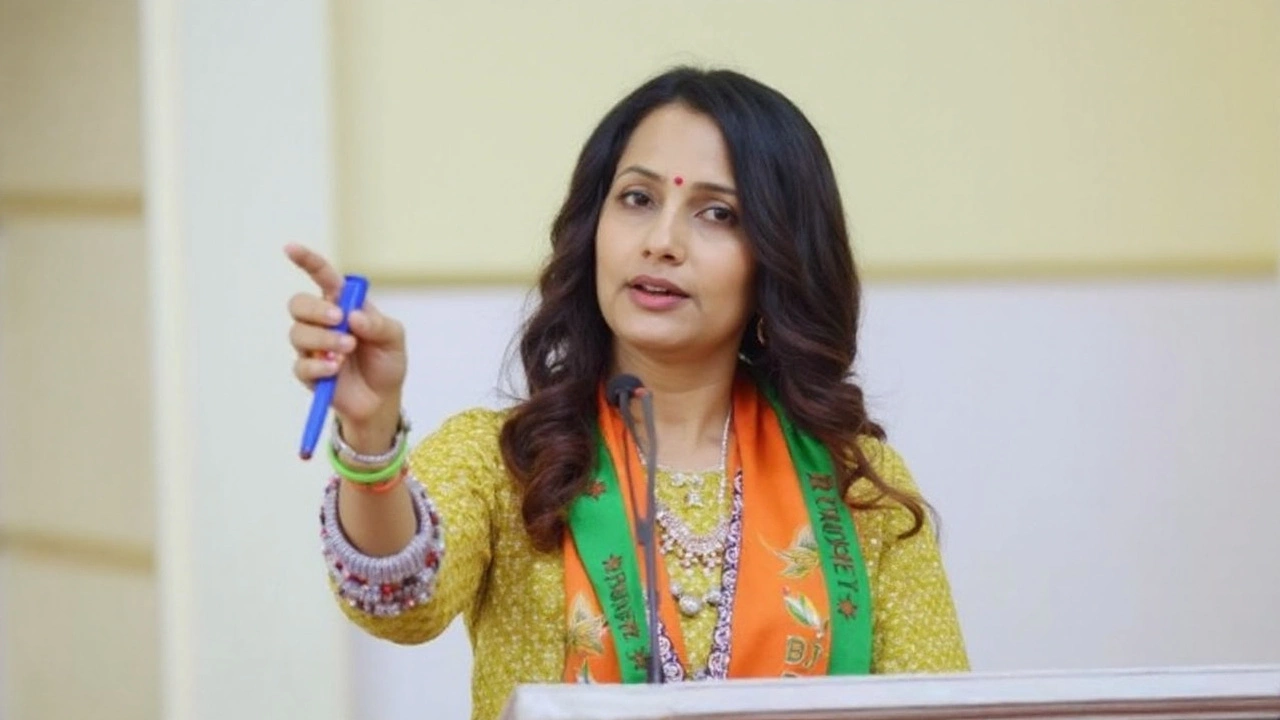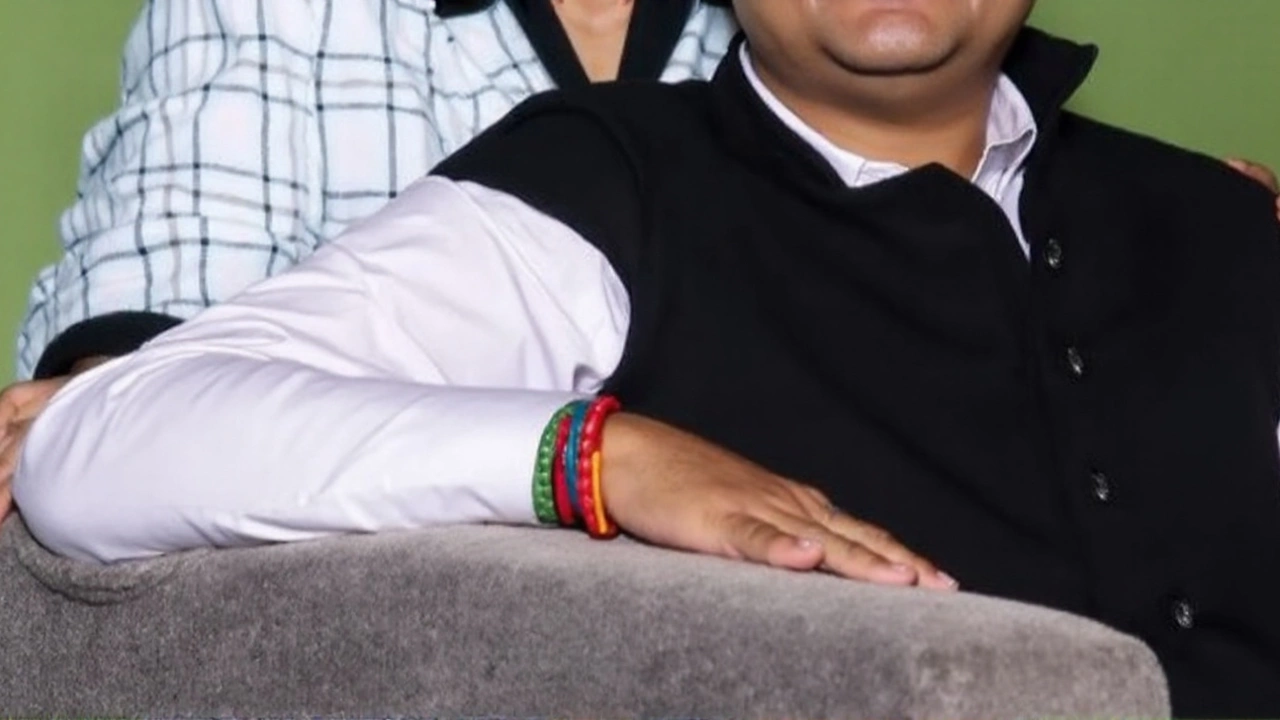A 90-minute spark that refused to fade
She calls him “completely unromantic.” Yet she says she fell for him in 90 minutes. That contrast—sharp, almost cinematic—sits at the heart of the relationship between Devendra Fadnavis and Amruta Fadnavis, a couple that has lived most of their adult life in the unforgiving glare of Maharashtra’s politics.
Their first meeting was ordinary on paper: a wedding of a mutual friend in Nagpur. What followed was anything but. Within an hour and a half of conversation, Amruta—by her own account—knew she wanted to marry him. It wasn’t a grand gesture or a carefully staged moment. It was a steady, matter-of-fact connection with a man who, she says, still doesn’t do flowers and candlelight.
The two married on December 5, 2005. Back then, he was a rising BJP leader with a reputation for long hours and a low-drama style; she was a banker on a fast track. Their romance began without pretense and moved fast, and they carried that energy into a marriage that has now spanned state power shifts, cabinet reshuffles, and relentless public scrutiny.
Amruta has never tried to rewrite the stereotype. She openly describes herself as the romantic partner, while he is the one who obsesses over work and policy dockets. Friends say the difference isn’t performative—it’s how they actually run their lives. He schedules everything, she improvises; he lives in the details, she lives in the moment. It makes their story relatable in a way political biographies rarely are.
Born on April 9, 1979, in Nagpur, Amruta grew up in a home anchored in medicine—her father, Dr. Sharad Ranade, is an ophthalmologist; her mother, Dr. Charulata Ranade, a gynaecologist. She didn’t choose the family profession. After graduating from G.S. College of Commerce and Economics in Nagpur, she pursued an MBA in Finance and also studied taxation laws at Symbiosis Law School, Pune.
Her banking journey began in 2003 at Axis Bank as an executive cashier—an entry-level, back-to-the-basics start. She moved up to head the business at the bank’s Nagpur branch and later took on bigger leadership roles, eventually serving as a Vice President. She balanced that career alongside a widening public profile, choosing not to step away from work even when the title of “first lady” arrived.
That title landed early. In 2014, at 44, Devendra Fadnavis became Maharashtra’s Chief Minister, making Amruta the youngest first lady in the state’s history. The sudden visibility was intense, but she leaned into it with an identity she had already built—banker, trained classical singer, and a social voice who preferred action to optics.
Music gave her a separate stage. Trained in classical vocals, she performed at public events and recorded singles, using her platform to raise funds and attention for civic causes. At the same time, she kept up with social initiatives, engaging in campaigns around education, health, and community welfare—spaces where a public figure can do real, measurable work.
In 2017, she represented India at the National Prayer Breakfast in Washington, an interfaith gathering that year presided over by then U.S. President Donald Trump. For a banker from Nagpur to share a platform with global leaders hinted at how quickly her world had expanded—and how comfortable she became navigating it.
The couple has a daughter. And by most accounts, they’ve tried to keep her life as normal as possible—routine school runs when schedules permit, family dinners without phones when they can manage it, privacy wherever security protocols allow.
The “unromantic” tag never truly left Devendra Fadnavis, and he does little to argue with it. His political career was built on a grind first honed in Nagpur’s civic politics. Born in 1970, he became Nagpur’s mayor in his late 20s, rose through the BJP’s state structure, and won repeated mandates as MLA. The 2014 win made him one of Maharashtra’s youngest chief ministers, a role defined by long meetings, policy pushes, and a relentless travel calendar.
If you’re wondering how a marriage survives that pace, the answer from those around them is uncomplicated: hard boundaries and shared respect. She kept her job because she wanted to. He kept his schedule because he had to. They carved out a small space where the public couldn’t follow—an everyday life with rules that didn’t make headlines.
Amruta’s decision to maintain her professional identity while being married to a chief minister isn’t unprecedented, but it’s still unusual in Indian politics. Political spouses are often defined by campaign trail appearances and charity boards. She chose boardrooms and quarterly targets, with music and social work on the side. It sent a message to younger professionals watching from the sidelines: you don’t have to pick one box.
Even their origin story—the 90-minute conversation at a friend’s wedding—cuts against the grain of public expectations. There was no dramatic preface, no carefully curated courtship. What clicked, she has said, was sincerity and clarity. He asked direct questions; she did the same. It felt less like a sweep-you-off-your-feet romance and more like two adults agreeing they wanted the same kind of life.
That dynamic shows up in their public roles too. Amruta often fronts softer engagements—community drives, music-led fundraisers—while he works the policy rooms and late-night briefings. When he takes oath, the conversation in their home isn’t about celebration, she has said; it’s about responsibility and the work ahead. The applause fades; the workload doesn’t.
Observers of Maharashtra politics will remember the turbulence since 2019—oath ceremonies that came and went, alliances made and unmade, and a steady reshaping of the state’s power map. Through that churn, Amruta’s own profile remained distinct: she showed up at bank meetings, on stage with a microphone, and at civic events tied to education and health. It’s a rare blend for a political spouse, and it is part of why their story keeps drawing attention.
Her early life explains some of that balance. Growing up with two doctors taught her discipline, she has said in past interactions; classical music added rigor; sport—she played tennis at the state level—brought competitiveness. The composite creates a person who doesn’t flinch at packed days and overlapping roles. In public life, that helps.
There is also the calibrating act that families in politics must get right: when to be visible, and when to disappear from view. She learned it on the job. Show up for work that moves the needle; skip the optics when they don’t. It protects the family’s private core and keeps professional credibility intact.
The couple’s friends describe their home dynamic with simple phrases: predictable, grounded, rule-bound. Birthdays aren’t a spectacle. Anniversaries are often delayed or reduced to a late dinner after a rally or a policy meeting. She might still wish for a little more romance; he might still forget the flowers. But they’ve built rituals that stick—a quick morning check-in before phones start buzzing, ten minutes together before bed even when schedules melt down.
When Amruta talks about him, she often returns to the same theme: steadiness. In a profession that rewards spectacle, a steady partner is rare currency. When he talks about her, the refrain is different: independence. He points to the fact that she didn’t let the role define her work life. The two ideas fit together neatly enough to explain a long marriage under pressure.
Their story lands differently today than it might have a decade ago. Younger voters are used to seeing political families on Instagram, but they’re also quick to ask what those families do beyond photo-ops. In that sense, the Fadnavises have a template: keep the day jobs, take the public roles seriously, be honest about what you are—and are not.
The 90-minute spark remains the headline, but the endurance is the real story: two people with opposite modes managing a shared life through elections, portfolios, and a tired label—“unromantic”—that, clearly, never stood a chance.

Amruta’s arc: banker, singer, citizen
Start with the resume. Banking since 2003. Executive cashier to branch business head, then senior leadership at Axis Bank. That trajectory didn’t pause when the barricades and beacons arrived. It coexisted with a parallel track—music stages, charity drives, and civic campaigns that relied less on titles and more on execution.
In 2014, she stepped into the role of Maharashtra’s youngest first lady and made it look matter-of-fact. In 2017, she appeared on the global civic circuit at the National Prayer Breakfast. In the years since, she has leaned into projects that pair visibility with outcomes—scholarship drives, health camps, and community events where you can count impact in numbers, not posts.
That’s perhaps why the personal revelation—“he’s unromantic; I’m the romantic one”—landed the way it did. It felt disarmingly normal. Power couples in India often present a polished, choreographed story. This one’s appeal is its ordinary imperfection. A banker who married a work-first politician. A conversation that turned into a life. A home that runs on habit, not grand gestures.
As Maharashtra’s politics keeps shifting, the couple’s public life will keep shifting with it. Oaths will be taken, alliances will be tested, calendars will break. The small rituals will likely remain: her insistence on an independent career; his insistence on the next briefing; a family dinner that starts late and ends later; and somewhere in there, a reminder that a 90-minute decision can hold for decades.
